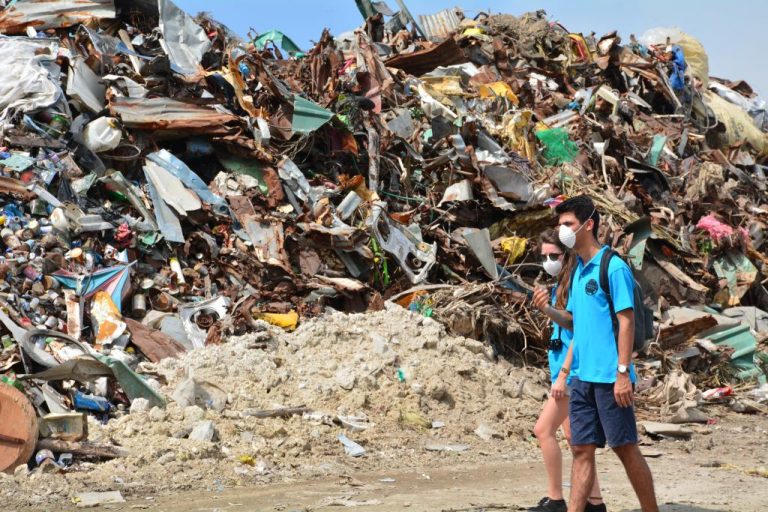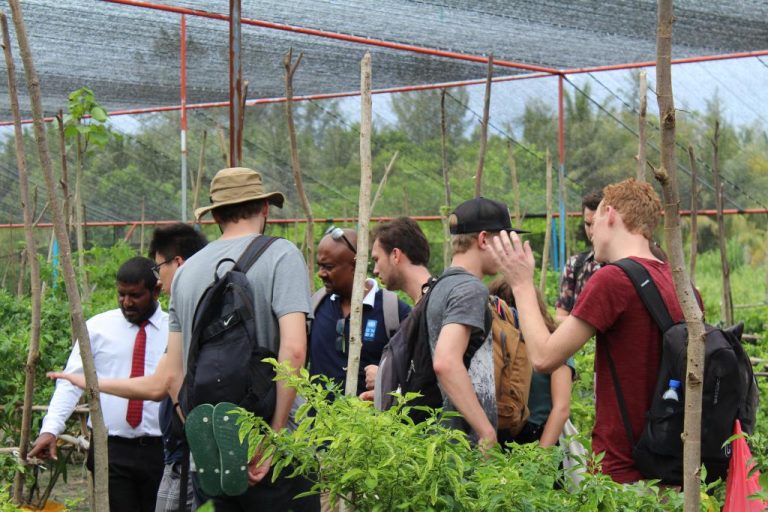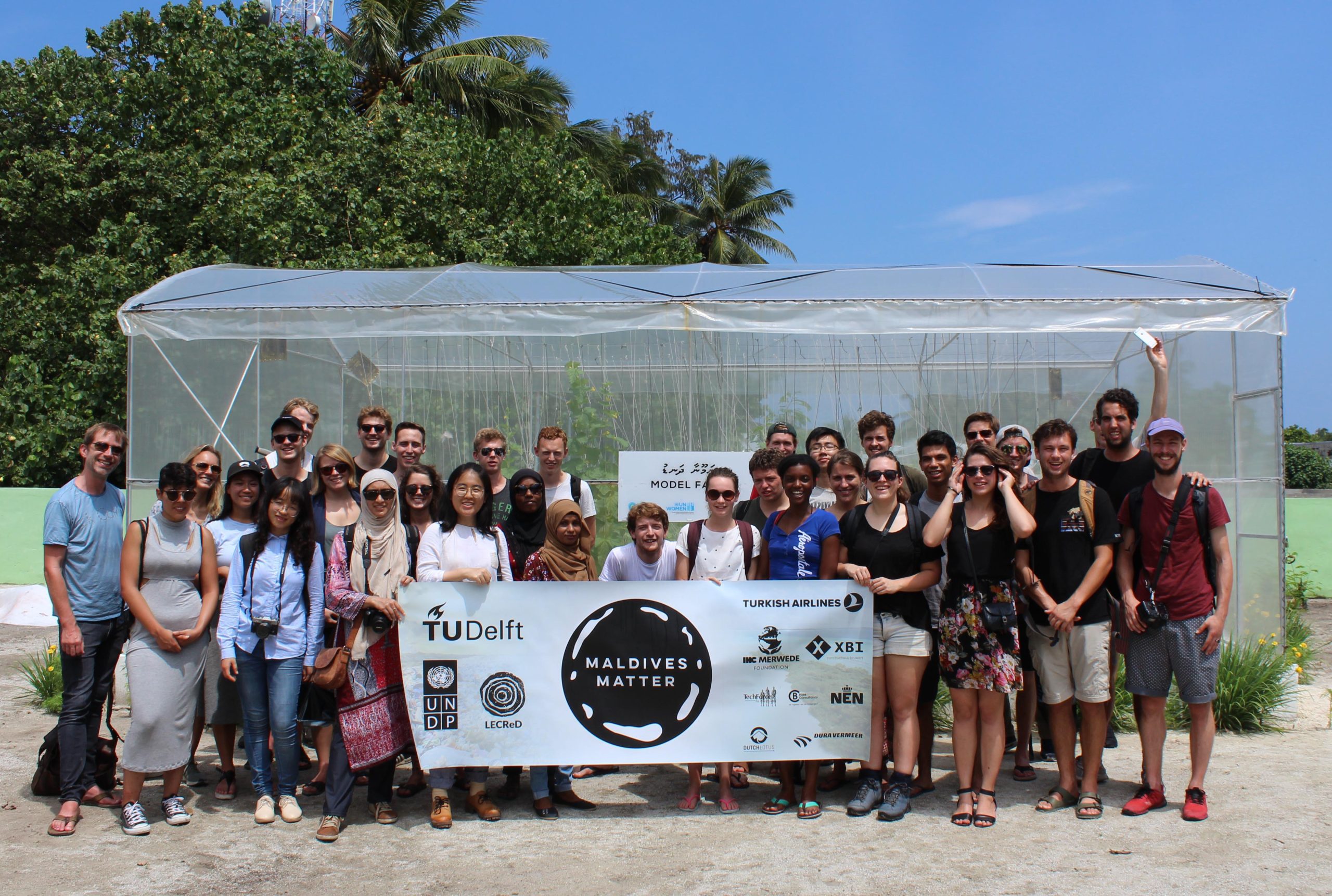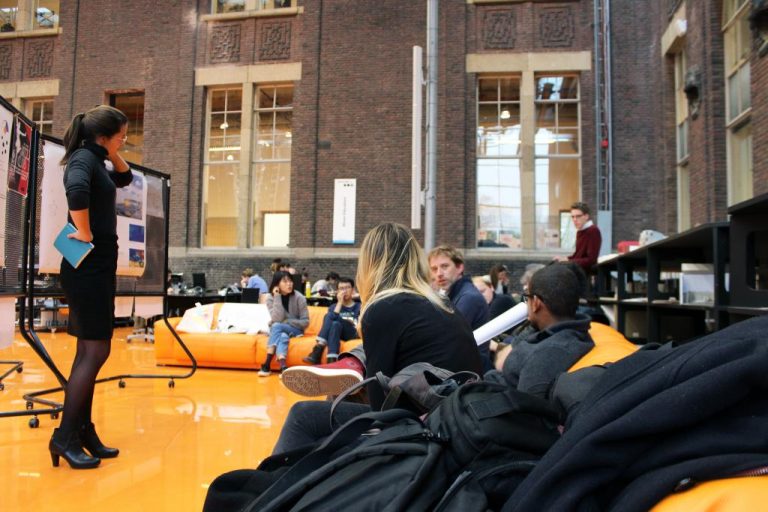Sipping coconut water on white pristine beaches, snorkelling amongst the most beautiful coral reefs on the planet – a dream that can be a reality, but for how much longer? The Maldives seems to be the most perfect place on earth, but this piece of paradise is under great threat. Sixty-four students of the Architectural Engineering Master are working on solutions.
Twenty-eight students and four lecturers made the trip to the Maldives. (Photo: Alexander de Caires)
- Problem 1: Waste
One major problem in the Maldives is the lack of suitable solid waste management. As a result, many of the small islands are polluted, particularly their coastlines and beaches. This does not only affect the immediate surroundings, but also the larger environment. With only one percent of the Maldives being land, litter tends to end up in the ocean. And the marine pollution directly affects the Maldives’ main economic sectors: tourism and fisheries.

Over thirty percent of the national GDP is based on tourism, which makes up an even larger proportion of its revenue. The pollution of both land and ocean not only jeopardises local flora and fauna, but its unsightliness is detrimental to the reputation of this tourist destination. Officially separated from the local population, hotels were usually built on designated resort islands and often had their own waste disposal infrastructure. Recent developments, however, have opened other islands for tourism. A clean and safe appearance is therefore becoming even more crucial for the Maldives’ future development.
Fishing is a major driver of the local economy, with over ninety-five percent of its exports being fish or fish related products. The absence of solid waste management compromises the industry’s future. Micro plastics, which proliferate in the marine environment, have been found to gradually climb up the food chain, affecting human health.
- Problem 2: Agriculture
Growing tourism, which is so very important for the country, brings about yet another problem. Large numbers of products are being imported from abroad, including many fruits and vegetables. A focus on high-end accommodation across the entire country has increased the demand for global foods and products. Despite the limited space, some of these could be produced locally, which would not only reduce costs but also the environmental effects of mass importing goods. A local production cycle could bring great economic benefits to local producers and consumers alike. Contributing factors to the low agricultural production rates include saline soil and humid and hot conditions, as well as extreme weather events, such as flooding.


In collaboration with the United Nations, TU Delft developed an architectural design brief for sixty-four Architectural Engineering Master studio students. Its objective is to address the Maldives’ two major issues of waste management and agriculture using architectural interventions to instigate positive change.
To gain greater insight, a group of enthusiastic students teamed up to organise a research trip. They formed a collective under the name Maldives Matter which worked to raise awareness around the aforementioned issues and reach out to interested sponsors and contributors, making on-site exploration possible. Twenty-eight students and four lecturers made the trip to the Maldives.
By the end of the trip, the first of two goals – to raise awareness – had been achieved. They had collected a bank of resources and analyses on which to draw. The activities throughout the trip were documented and shared through their online Maldives Matter journal. The students then began to work on their individual proposals according to the initial brief.

In their next blog, the students will tell more about the current state of the projects and possible solutions.
Alexander de Caires, Thomas Edes and Nadine Tietje
- Symposium Maldives Matter, 30 January 14:00-16:00 Berlage Room, BK City.This event will conclude the activities of the Master Architectural Engineering Master and will be open to both students and sponsors. It aims to start a dialogue between all stakeholders and interested parties.
Delta Lab / Delta Lab offers you the opportunity to share anything you really care about with the entire University community. E-mail us at delta@tudelft.nl.


Comments are closed.